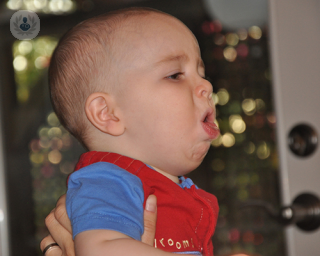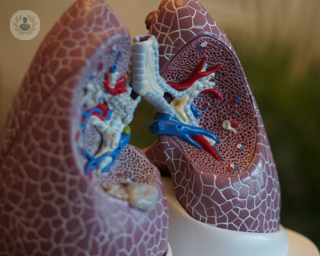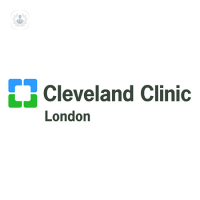Pneumonia
Dr Atul Gupta - Paediatric respiratory medicine
Created on: 11-13-2012
Updated on: 10-23-2023
Edited by: Karolyn Judge
What is pneumonia?
Pneumonia is an acute inflammatory condition of one or both of the lungs caused by infection. It primarily affects the alveoli which are the small air sacs deep in the lungs, where oxygen passes into the bloodstream and carbon dioxide passes out back into the lungs. In people with pneumonia, these air sacs become inflamed and fill with fluid or pus.

What causes pneumonia?
Pneumonia is not a specific type of infection, but rather an effect that can be created by several causes, mainly bacteria or viruses. Many types of bacteria, viruses, and even some fungi can cause pneumonia. In total, there are over 30 different causes of pneumonia. The most common cause is infection by the bacteria Streptococcus pneumonia. Other culprits include:
- bacteria: haemophilus influenza, straphylococcus aureus
- viruses: respiratory syncytial virus (RSV), influenza type A, influenza type B
- fungal: rare in the UK
- aspiration: breathing in something harmful, such as smoke, chemicals, vomit, or a foreign object
Who is at risk for pneumonia?
Those at a greater risk of catching pneumonia include babies, elderly people, smokers, people with compromised immune systems, such as those with HIV or AIDS, or who have recently had flu, and people with other chronic health issues, such as asthma, cystic fibrosis, or heart disease.
Is pneumonia deadly?
The severity can vary with some patients, particularly those previously mentioned who are at a higher risk, becoming very ill. Some may need hospital treatment, and for some it can even prove fatal.
How can pneumonia be prevented?
While most cases of pneumonia are bacterial in nature and aren’t contagious, you can reduce the risk of it spreading by maintaining good standards of hygiene, for example, by covering your mouth and nose when coughing or sneezing, throwing away tissues immediately since germs can survive for hours after leaving your body, and washing your hands regularly.
Avoiding smoking and reducing alcohol intake can help to maintain your lungs and their natural defences, as smoking and drinking can weaken them. People with a higher risk of infection are advised to have the pneumococcal vaccine and flu vaccine.
What are the signs and symptoms of pneumonia?
The symptoms depend on many factors such as the cause and patient’s health and age. As the alveoli are filled with fluid, pneumonia can cause difficulty breathing, coughing and chest pain. Other common signs of pneumonia include:
- fever
- coughing up mucus
- sweating and shivering
- loss of appetite
- feeling generally unwell
- rapid heartbeat
- fatigue
Less commonly, patients may experience:
- headaches
- nausea or vomiting
- wheezing
- joint and muscle pain
- coughing up blood
- confusion or delirium, especially in older patients

What is walking pneumonia?
In very mild cases, patients feel fine with pneumonia. They don’t require rest or hospitalisation. The informal term for this is ‘walking pneumonia’ because patients are able to walk around and continue with their normal lives.
What can be mistaken for pneumonia?
Pneumonia shares many symptoms with other conditions such as colds, flu, bronchitis, and asthma.
When should you seek medical assistance for pneumonia?
If you, or someone around you, is having severe trouble breathing, producing blood when they cough, has turned bluish in colour, or general appears unwell or has had a concerning change of behaviour, you should call for an ambulance.
How is pneumonia diagnosed?
A doctor may be able to diagnose a patient by taking their health history into account and performing a physical exam. Tests may also be carried out to confirm diagnosis, such test include:
- chest x-ray
- blood tests
- chest CT scan
- tests on the sputum (what is coughed up)
- bronchoscopy
- pulse oximetry (to measure levels of oxygen in the blood)
Can pneumonia go away without treatment?
It depends on the type, or cause, of pneumonia. Viral pneumonia generally will clear up on its own.
How is pneumonia treated?
Treatment largely depends on the cause of the pneumonia. Milder cases of pneumonia may be treated at home with plenty of rest and fluids, and by taking antibiotics, if appropriate. For serious cases, the patient may need to be hospitalised, and treated by doctors there. Oxygen therapy can be beneficial for some patients.
How long does recovery from pneumonia take?
The speed of recovery depends on the individual case. It is not uncommon for recovery to take weeks, and even months for all the symptoms, particularly fatigue, to resolve.
What are the potential complications of pneumonia?
Most patients recover well following treatment for pneumonia. In high-risk patients, however, complications can arise. These may include:
- acute respiratory distress syndrome (ARDS)
- pleural effusion, accumulation of fluid in the lung
- bacteremia, or bacteria in the blood stream
- lung abscesses
- respiratory failure is due to pleurisy, the inflammation of the lining between the ribs and lungs.
- sepsis













